- Home
- Mildred A. Wirt
The Girl Detective Megapack: 25 Classic Mystery Novels for Girls Page 6
The Girl Detective Megapack: 25 Classic Mystery Novels for Girls Read online
Page 6
“There’s somebody on the porch—several people, I think,” said Mary Louise as the girls turned into the street on which the Grants’ house was situated.
“Two men,” added Jane as they came nearer. “I think the person sitting down is a woman. But it’s getting too dark to see clearly.”
“All the better! That’s just what we want. Let’s cut across the lot to the back of the place, and sneak up behind the car in the driveway. We can see the porch from there.”
“But I’m afraid we’ll be caught,” objected Jane fearfully.
Nevertheless, she followed Mary Louise around a side street to the rear of the lot, and together they climbed the Grants’ fence, cautiously and silently. Once inside, they crept noiselessly along the grass near the fence until they came to the back of Harry Grant’s car.
There could be no doubt that it was his. At least five years old, with battered mudguards and rusted trimmings, it looked like the relic Elsie had laughed about. It was a small black coupé, with a compartment behind for carrying luggage.
“If Mr. Harry Grant goes for a ride in this, we’re going with him!” announced Mary Louise.
“No!” cried her chum. “How could we?”
“In the luggage compartment.”
“We’d smother.”
“No, we wouldn’t. We’d open the lid after we got started.”
“Suppose he locked us in?”
“He can’t. I just made sure that the lock has rusted off.”
“But what good would it do us to ride with him?” demanded Jane.
“Sh! They might hear us!” warned Mary Louise. She turned to the dog and patted him. “You keep quiet too, Silky.… Why,” she explained in a whisper, “we could watch to see whether Mr. Harry spends any money. If he brings out a fifty-dollar bill, he’s a doomed man!”
“You are clever, Mary Lou!” breathed her chum admiringly. “But it’s an awful risk to take.”
“Oh no, it isn’t. Mr. Grant isn’t a gangster or a desperate character. He wouldn’t hurt us.”
Jane looked doubtful.
“Have you made out who the people are on the porch?” she asked.
“It must be Mrs. Grace Grant—and her two sons. Yes, and I feel sure that is Harry, coming down the steps now.… Listen!”
The girls’ eyes, more accustomed to the darkness, could distinguish the figures quite plainly by now. The younger of the two men, with a satchel in his hand, was speaking to his mother.
“I ought to be back by Saturday,” he said in a loud, cheerful voice. “And if this deal I’ve been talking about over in New York goes through, I’ll be driving home in a new car.”
“You better pay your debts first, Harry,” cautioned his mother.
“I hope to make enough money to do both,” he returned confidently. “And if you see Aunt Mattie, you can tell her I don’t need her help!”
Mary Louise nudged Jane’s arm at this proud boast and repressed a giggle.
“Maybe he can fool his mother,” she whispered. “But he can’t fool us! Come on, get in, Jane.”
Holding open the lid of the car’s compartment she lifted Silky in and gave her hand to her chum.
“Suppose he puts his satchel in here,” said Jane, when they were all huddled down in the extremely small space and Mary Louise had cautiously let down the lid, shutting them in absolute darkness.
“He won’t—not if it has money in it. He’ll keep it right on the seat beside him.… He will anyway, because it doesn’t take up much room.”
The car rocked to one side, indicating that Harry Grant had stepped in and was seating himself at the wheel. Jane’s lip trembled.
“It’s so dark in here! So terribly dark! Where’s your hand, Mary Lou?”
“Here—and here’s Silky. Oh, Jane, this is going to be good!”
The motor started, and the car leaped forward with a sudden uneven bound. Jane repressed a cry of terror. It turned sharply at the gate and buzzed along noisily for several minutes before Mary Louise cautiously raised the lid and looked out.
Oh, how good it was to see the lights again, and the sky—after that horrible blackness!
The car had reached the open highway which led out of Riverside, and it picked up speed until it was rattling along at a pace of about sixty miles an hour. Growing bolder, Mary Louise continued to raise the lid of the compartment until it was upright at its full height. The girls straightened up, with their heads and shoulders sticking out of the enclosure.
“Quite a nice ride after all, isn’t it?” observed Mary Louise, gazing up at the stars.
“I don’t know,” returned Jane. “It sounds to me as if there were something wrong with that engine. If we have an accident—”
“That’s just what I’m hoping for,” was the surprising reply. “Or rather, a breakdown.”
“Whatever would you do?”
“I’ll tell you. Listen carefully, so we’ll be prepared to act the minute the car stops. While Harry gets out on the left—he surely will, because his wheel is on the left—we jump out on the right. If there are woods beside the road, as I remember there are for some distance along here, we disappear into them. If not, we get to the path, and just walk along as if we were two people out for a walk with their dog. He won’t think anything about that, for he doesn’t know us, or know that we came with him.”
“But how will that help us to find out whether he is the thief?” inquired Jane.
“My plan is to grab that satchel, if we get a chance, and run off with it!”
“But that’s stealing, Mary Lou! He could have us arrested.”
“Detectives have to take chances like that. It isn’t really stealing, for we want to get hold of it merely to give its contents to the rightful owner. Of course, if there’s no money in it, we could return it later.”
They were silent for a while, listening to the pounding of the engine. Fifteen minutes passed; Mary Louise saw by her watch when they rode under a light that it was quarter after nine, and she recalled her promise to her mother. But she couldn’t do anything about it now.
They were ascending a hill, and the speed of the car was diminishing; it seemed to the girls that they were not going to make it. The engine wheezed and puffed, but the driver was evidently doing his best. Ahead, on the left, shone the lights of a gas station, and this, Mary Louise decided, must be the goal that Harry was now aiming for.
But the engine refused to go the full distance: it sputtered and died, and the girls felt the car jerked close to the right side, with no sign of civilization about except the lighted gas station about fifty yards ahead.
But, lonely or not, the time had come for action, and there was not a second to be lost. Before Harry Grant’s feet were off the running board both girls were out of the car on the other side, holding Silky close to them and hiding in the shadow.
Mr. Grant stepped forward and raised the hood of his motor, peering inside with a flashlight. Keeping her eye on him through the open window of the car, Mary Louise crept cautiously along the right side towards the front.
The young man turned about suddenly and swore softly to himself. But it was not because he had seen or heard the girls, although Jane did not wait to find that out. Desperately frightened, she dashed wildly into the protecting darkness of the bushes at the side of the road.
Mary Louise, however, remained steadfastly where she was, waiting for her opportunity.
It came in another moment. Lighting a cigarette, Mr. Grant started to walk to the gas station.
“What could be sweeter!” exclaimed Mary Louise rapturously to herself, for Jane was out of hearing distance by this time. “My big chance!”
She reached her hand quickly through the open window and picked up the satchel from the seat. Then, with Silky close at her heels, she too made for the protecting woods. In another moment she was at Jane’s side, breathless and triumphant.
“You’re all right?” demanded her chum exultantly. “Oh, Mary Lou, you’
re marvelous!”
“Not so marvelous as you think,” replied the other, feeling for Jane’s hand in the darkness. “Lift that satchel!”
Jane groped about, and took it from Mary Louise, expecting a heavy weight.
But it was surprisingly, disappointingly light!
“It can’t possibly contain any gold,” said Mary Louise, dropping to the ground in disgust. “All our trouble—and we’re only a common pair of thieves ourselves!”
Silky came close to her and licked her hand reassuringly, as if he did not agree with her about the name she was calling herself and Jane.
“Stranded on a lonely road—at least ten miles from home!” wailed Jane.
“Sh!” warned Mary Louise. “They’re at the car—Harry and another man. We might be caught!”
But she stopped suddenly: something was coming towards them, as they could sense from the snapping of a twig close by. Not from the road, however, but from the depth of the woods!
CHAPTER VII
“Hands Up!”
The two girls sat rigid with terror, Mary Louise holding tightly to Silky. In the darkness they could see nothing, for the denseness of the trees blotted even the sky from view. The silence of the woods was broken only by a faint rustle in the undergrowth, as something—they didn’t know what—came nearer.
Silky’s ears were alert, his body as tense with watching, and Jane was actually trembling.
“Got your flashlight, Mary Lou?” she whispered.
“Yes, but I’m afraid to put it on till Harry Grant gets away. He might see it from the road.”
The sudden roar of the motor almost drowned out her words. The noise startled whatever it was that was near them, and the girls felt a little animal pass so close that it nearly touched them. They almost laughed out loud at their fear: the cause of their terror was only an innocent little white rabbit!
Mary Louise took a tighter grip upon her dog.
“You mustn’t leave us, Silky! You don’t want that bunny! We need you with us.”
The engine continued to roar; the girls heard the car start, and drive away. Jane uttered a sigh of relief.
“I wonder whether he missed his satchel,” she remarked.
“Probably he didn’t care if he did,” returned her chum. “I don’t believe it has anything in it but a toothbrush and a change of linen.”
“Let’s open it and see.”
Mary Louise turned on her flashlight and looked at the small brown bag beside them.
“Shucks!” she exclaimed in disappointment. “It’s locked.”
“It would be. Well, so long as we have to carry it home, maybe we’ll be glad that it’s so light.”
“I’ve got my penknife. I’m going to cut the leather.”
“But, Mary Lou, it doesn’t belong to us!”
“Can’t help that. We’ll buy Harry Grant a new one if he’s innocent.”
“Okay. You’re the boss. Be careful not to cut yourself.”
“You hold the flashlight, Jane,” said Mary Louise, “while I make the slit.”
The operation was not so easy, for the leather was tough, but Mary Louise always kept her knife as sharp as a boy’s, and she succeeded at last in making an opening.
Excitedly both girls peered into the bag, and Jane reached her hand into its depths. She drew it out again with an expression of disappointment.
“An old Turkish towel!” she exclaimed in dismay.
But Mary Louise’s search proved more fruitful. Her hand came upon a bulky paper wad, encircled by a rubber band. She drew her hand out quickly and flashed the light upon her find.
It was a fat roll of money!
The girls gazed at her discovery in speechless joy. It seemed more like a dream than reality: one of those strange dreams where you find money everywhere, in all sorts of queer, dark places.
“Hide it in your sweater, Mary Lou!” whispered Jane. “Now let’s make tracks for home.”
Her companion concealed it carefully and then took another look into the satchel to make sure that none of the gold was there. She even inserted the flashlight into the bag, to confirm her belief. But there was nothing more.
Both girls got to their feet, Jane with the satchel still in her hands.
“I wish we were home,” she remarked after the flashlight had been turned off, making the darkness seem blacker than before.
“We can pick up a bus along this road, I think,” returned Mary Louise reassuringly. “They ought to run along here about every half hour.”
“Shall we use some of this money for carfare?”
“No, we don’t have to. I have my purse with me.”
Choosing their way carefully through the bushes and undergrowth, the two girls proceeded slowly towards the road. But their adventures in the wood were not over. They heard another rustle of twigs in front of them, and footsteps. Human footsteps, this time!
“Hands up!” snarled a gruff voice.
The reactions of the two girls and the dog were instantaneous—and utterly different. Jane clutched her chum’s arm in terror; Mary Louise flashed her light upon the man—a rough, uncouth character, without even a mask—and Silky flew at his legs. The dog’s bite was quick and sharp: the bully cried out in pain. Mary Louise chuckled and, pulling Jane by the hand, dashed out to the road, towards the lights of the gas station in the distance. As the girls retreated, they could hear groans and swearing from their tormentor.
When they slowed down across the road from the gas station, Mary Louise looked around and whistled for Silky. Jane, noticing that she still clutched the empty bag in her hand, hurled it as far as she could in the direction from which they had come.
In another moment the brave little dog came bounding to them. Mary Louise stooped over and picked him up in her arms.
“You wonderful Silky!” she cried, as she led the way across the road. “You saved our lives!”
“Suppose we hadn’t taken him!” said Jane in horror. “We’d be dead now.”
“Let’s go ask the attendant about buses,” suggested Mary Louise, still stroking her dog’s head.
“We better not!” cautioned Jane. “He may suspect us, if Harry Grant told him about his loss of the satchel.”
“Oh no, he won’t,” replied Mary Louise. “Because we’ll tell him about the tramp, or the bandit, or whatever he is—and he’ll suspect him.”
They walked confidently up to the man inside the station.
“We’re sort of lost,” announced Mary Louise. “We want to get to Riverside. There was a tramp back there about fifty yards who tried to make trouble for us. Can we stay here until a bus comes along—they do run along here, don’t they?”
“Yes, certainly,” replied the man, answering both questions at once. “About fifty yards back, you say? Did he have a brown satchel with him?”
“I saw a brown satchel lying in the road,” replied Mary Louise innocently. “Why?”
“Because a motorist stopped there a few minutes ago with engine trouble, and while he came to me for help his grip was stolen.”
“Did it have anything valuable in it?” inquired Jane, trying to keep her tone casual.
“Yes. I believe there was about eight hundred dollars in it.”
Mary Louise gasped in delight. That meant that practically all of Miss Grant’s paper money was there—in her sweater! All but one fifty-dollar bill!
“Well, I wouldn’t go back there for eight thousand dollars!” said Jane.
“You can be sure there ain’t any money in the bag now,” returned the attendant shrewdly. “Here comes your bus. You’re lucky: they only run every half hour.… I’ll go stop it for you.”
Mary Louise kept Silky in her arms, and the two girls followed their protector to the middle of the road. The bus stopped, and the driver looked doubtfully at Silky.
“Don’t allow no dogs,” he announced firmly.
“Oh, please!” begged Mary Louise in her sweetest tone. “Silky is such a good, brave do
g! He just saved our lives when we were held up by a highwayman. And we have to get home—our mothers will be so worried.”
“It’s agin’ the rules—”
“Please let us this time! I’ll hold him in my lap.” Her brown eyes looked into his; for a moment the man thought Mary Louise was going to cry. Then he turned to the half a dozen passengers in his car.
“I’ll leave it up to youse. Would any of youse people report me if I let this here lady’s dog in the bus?”
“We’d report you if you didn’t,” replied a good-natured woman with gray hair. “These girls must get home as quickly as possible. It’s not safe for them to be out on a lonely road like this at night.”
“Oh, thank you so much!” exclaimed Mary Louise, smiling radiantly at the kind woman. “It’s so good of you to help us out.”
The door closed; the girls waved good-bye to the attendant, and the bus started. Mary Louise gazed dismally at her watch.
“Even now we’ll be an hour late,” she remarked. “We promised our mothers we’d be home by half-past nine!”
“Girls your age shouldn’t go lonely places after dark,” observed the motherly woman. “Let this be a lesson to you!”
“Oh, it will be, we assure you!” Jane told her. “One experience like this is enough for us.”
The bus rumbled on for twenty minutes or so and finally deposited the girls in Riverside, half a block from their homes.
“Still have the money?” whispered Jane, as they ran the short distance to their gates.
“Yes, I can feel the wad here. I was so afraid somebody in the bus would notice it. But having Silky in my lap helped.”
“It seems we have company,” remarked Jane, recognizing a familiar roadster parked in front of their houses.
“Now what can Max want at this time of night?” demanded Mary Louise impatiently. She longed so terribly to get into her room by herself and count the money.
“Here they are, Mrs. Gay!” called a masculine voice from the porch. “They’re all right, apparently.”
The two mothers appeared on Mary Louise’s porch.
“What in the world happened?” demanded Mrs. Patterson. “Mrs. Gay and I have been worried to death.”
“Not to mention us,” added Norman Wilder from the doorstep. “We phoned all your friends, and nobody had seen a thing of you.”

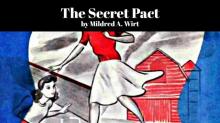 The Secret Pact
The Secret Pact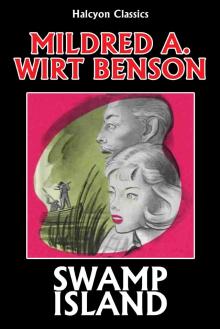 Swamp Island
Swamp Island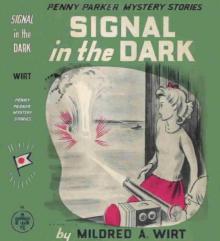 Signal in the Dark
Signal in the Dark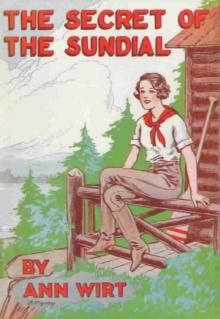 The Secret of the Sundial
The Secret of the Sundial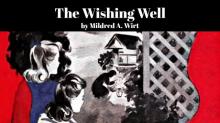 The Wishing Well
The Wishing Well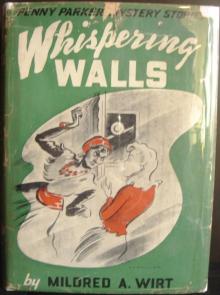 Whispering Walls
Whispering Walls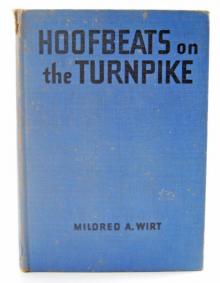 Hoofbeats on the Turnpike
Hoofbeats on the Turnpike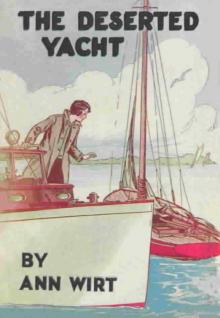 The Deserted Yacht
The Deserted Yacht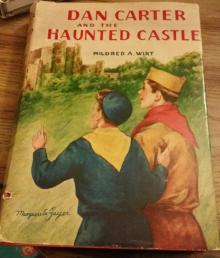 Dan Carter and the Haunted Castle
Dan Carter and the Haunted Castle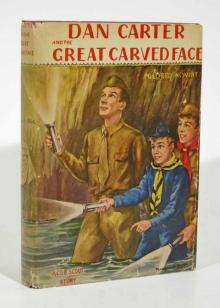 Dan Carter and the Great Carved Face
Dan Carter and the Great Carved Face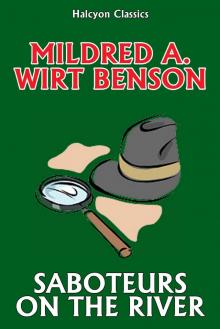 Saboteurs on the River
Saboteurs on the River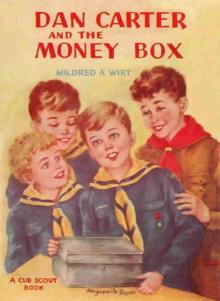 Dan Carter and the Cub Honor
Dan Carter and the Cub Honor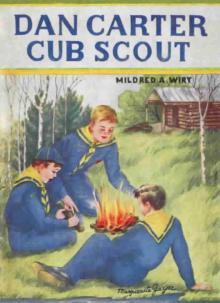 Dan Carter-- Cub Scout
Dan Carter-- Cub Scout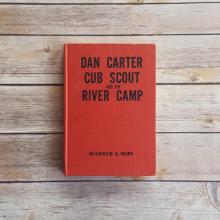 Dan Carter, Cub Scout, and the River Camp
Dan Carter, Cub Scout, and the River Camp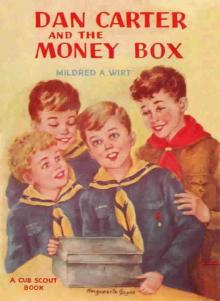 Dan Carter and the Money Box
Dan Carter and the Money Box The Girl Detective Megapack: 25 Classic Mystery Novels for Girls
The Girl Detective Megapack: 25 Classic Mystery Novels for Girls